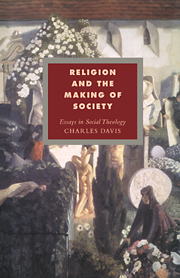Book contents
- Frontmatter
- Contents
- General editors' preface
- Acknowledgements
- Introduction: from the secular to the supernatural
- PART I Society, religion and human agency
- 1 Society and the critique of modernity
- 2 The present social function of religion
- 3 From inwardness to social action: the transformation of the political
- 4 The Christian question to radicalism
- PART II Praxis, narrative and religious language
- PART III From the modern subject to the postmodern self
- PART IV The option for the future
- Index
- Cambridge Studies In Ideology And Religion
1 - Society and the critique of modernity
Published online by Cambridge University Press: 18 December 2009
- Frontmatter
- Contents
- General editors' preface
- Acknowledgements
- Introduction: from the secular to the supernatural
- PART I Society, religion and human agency
- 1 Society and the critique of modernity
- 2 The present social function of religion
- 3 From inwardness to social action: the transformation of the political
- 4 The Christian question to radicalism
- PART II Praxis, narrative and religious language
- PART III From the modern subject to the postmodern self
- PART IV The option for the future
- Index
- Cambridge Studies In Ideology And Religion
Summary
There is no doubt that Roberto Unger has identified an insight basic to modern society and to modern social and political theory: society is an artifact. I fully endorse his attempt to consistently work out the implications of that basic insight against the constant temptation of human beings to give unconditional authority to conditional forms, thus concealing from themselves the process of imagining and making society and its institutions. Unger is right in supposing that viewing society as an artifact combines the liberal/leftist aim of freeing society from structures of dependence and domination with the modernist goal of rescuing subjectivity and intersubjectivity from rigid roles. I find no difficulty, then, in responding favourably to Unger's work as a major contribution to our thinking about society. The clarification of our freedom to reimagine and remake the social worlds which we have constructed and in which we live is undoubtedly the way forward from our present situation.
At the same time, coming to the question of society from the study of religion and the philosophy of history, I confront a series of difficulties and objections in embracing the thesis that society is an artifact. In the pages that follow I will sketch out some of these problems.
Although religion has sometimes fuelled revolution, it has historically more often been a factor of social integration. It has secured the social order by declaring that order sacred (or at least of sacred origin), thus giving it what Unger would label a false necessity and a mistaken unconditionality. It is true that, in the Christian West, the frequent conflict of Church and State has forged a distinction between the sacred and the secular.
- Type
- Chapter
- Information
- Religion and the Making of SocietyEssays in Social Theology, pp. 21 - 38Publisher: Cambridge University PressPrint publication year: 1993

